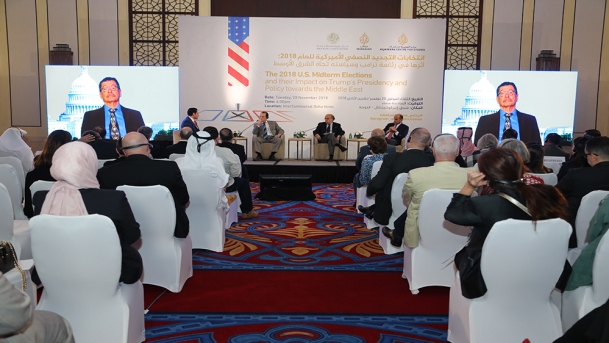
Al Jazeera Centre for Studies and the Brookings Doha Center hosted a seminar in collaboration with Al Jazeera Mubasher on Tuesday, 20 November 2018 in Doha entitled "The 2018 U.S. Midterm Elections and their Impact on Trump's Presidency and Policy towards the Middle East".
The seminar discussed the results of the midterm congressional elections and examined their ramifications, especially for the influence of the Democratic majority; Trump's domestic policy and U.S. foreign relations particularly with the Middle East. In addition, the speakers forecasted the features of the upcoming U.S. presidential election in 2020 in light of the midterm election results.
The speakers were: Mohammed Cherkaoui, Senior Researcher at Al Jazeera Centre for Studies; Philip Grey, Assistant Professor of Political Science at Texas A&M University, Qatar; Clyde Wilcox, Professor of Government at Georgetown University (via satellite); and Adnan Hayajneh, Professor of International Relations at Qatar University.
Wilcox argued that the U.S. midterm elections were a setback for President Trump and his administration, and a decisive victory for the Democratic Party.
Grey's view was that President Trump's focus in the coming period will be on issues that are a priority to his electoral base and that he will avoid contentious issues. Grey added that Trump give attention to trade with China and other countries and regional blocs, in addition, of course, to the portfolios that he personally oversees.
Cherkaoui predicted that Trump's concerns will increase by the beginning of next year because of the decline of the already exhausted Trumpism.
On Saudi-U.S. relations, Hayajneh maintained that Saudi Arabia is part of the U.S. foreign policy strategy. He added that relations between the two countries are not new and have not changed substantially, despite the change of the person of the American president or the Saudi ruler.
Given the international dimension of the assassination of Saudi journalist Jamal Khashoggi at the Saudi consulate in Istanbul and its influence on the American political scene, Cherkaoui explained that Trump is clinging to the Saudi crown prince, Mohammed bin Salman, for personal, ideological and political reasons. However, Cherkaoui said that Trump may become pragmatic at any given moment and, if he feels that the Saudi crown prince will cause him more pressure, take a different stance.
In addition, Grey argued that the Khashoggi case is not likely to affect the United States domestically, considering the role played by bin Salman in favor of Israel, which is a key determinant in Saudi relations with the Trump administration.
Wilcox held that it would be difficult for Congress to take a decisive stance on the Khashoggi case after the departure of its most important members, "but if Jared Kushner is convicted, we will inevitably see a change in Trump's behaviour toward Saudi Arabia."
With regards to U.S. economic sanctions against Iran, Cherkaoui explained, "U.S. policy towards Iran is not rigid; there is a kind of retreat from the warning of sanctions, and the pragmatism and flexibility of Trump in this matter is clear". Wilcox also noted that "the pressure from the House of Representatives on the US president over the war on Yemen will be limited".